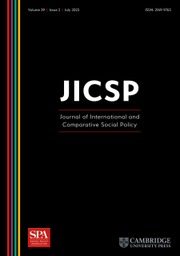Article contents
Global social policy: an application of welfare state theory
Published online by Cambridge University Press: 09 March 2020
Abstract
Global social policy (GSP) takes different forms from those of national welfare states, since it depends on the activities of an array of international organisations and transnational actors. Three broad theoretical approaches have dominated the literature on national welfare state development: those focused on processes of economic development, industrialisation and urbanisation; those focused on class struggle and political mobilisation; and those focused on the effects of political institutions. This article applies each of these broad theoretical approaches to the development of GSP in order to illuminate the nature of GSP, its likely future development, and the constraints upon such development. It is concluded that the dominant forms taken by GSP will continue to be piecemeal, minimalist and essentially neoliberal for as long as an effective global political movement in favour of a more extensive GSP is absent.
- Type
- Articles
- Information
- Journal of International and Comparative Social Policy , Volume 34 , Issue 1 , February 2018 , pp. 40 - 57
- Copyright
- Copyright © 2017 Informa UK Limited, trading as Taylor & Francis Group
References
- 8
- Cited by


